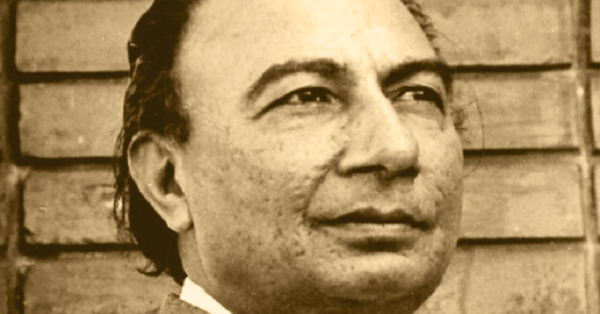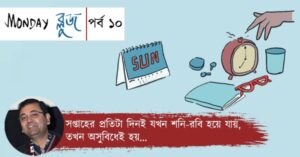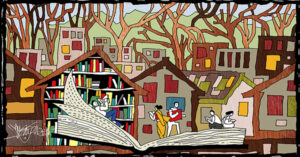In 1921, a boy was born to Fazal Mohammad, a wealthy jagirdar who lived near Ludhiana. It would perhaps be more accurate to say that he was born to his mother, Sardar Begum, since his father had many wives – eleven in all – and it was Sardar Begum who single-handedly raised the boy.
The true test of the boy’s mettle came around 1930, when his father wanted his only son to come back to him and become heir to his jagir. Sardar Begum refused to part with her son, stating firmly that Fazal Mohammad would have to accept her presence as his wife if he wanted his son, a demand that Fazal Mohammad did not agree to. The matter soon turned into a bitter custody battle, and was settled when the young boy turned away from the wealth and comfort of his inheritance to stay in straitened circumstances with his mother. It was on that day Sahir Ludhianvi was born, as he realised the power of principles through his loyalty and love for his mother. It was a decision that exposed him to deprivations and hardships, a phase he never forgot. Sardar Begum’s love and care in raising Sahir often cast its influence in his songs and poems. Maternal love and a woman’s helplessness in the face of patriarchy were recurring themes for the poet. Sahir was and would always remain his mother’s loving son.
He withstood the challenges that life threw at him as a child and young man and dreamt of a better life, a happier and more comfortable time for both his himself and for society at large. As a young man, he started working in a magazine in Lahore in the early 1940s. In 1945, he published his nazms and ghazals in a collection called Talkhiyan. The word means bitterness, and reflects the suffering, tribulations and the insults that the world must have thrown at the young man, making him feel that this was an apt title for his maiden work. Perhaps that talkhiyan never really left Sahir’s life, it was the other legacy his difficult growing years and his mother’s suffering bequeathed him. It would colour and mar many of his relationships in the years ahead.
Sahir was a progressive, forward-thinking and enlightened young man who was very open about his views and opinions. He wrote against religious fundamentalism and narrow-mindedness in a magazine called Savera and soon fatwas were issued and an arrest warrant, too, was on its way. Sahir fled to Delhi and got by on small jobs. It was at this time that he met fellow poet Amrita Pritam, a meeting and relationship that is documented by the latter.
Amrita Pritam was unreserved in her love and devotion towards Sahir. Even a cigarette stub that grazed his lips was a thing of value for the young poetess. Did Sahir love her back in equal measure and with equal ardour? It is hard to tell, but it was clear that he was keenly aware that love was not the only dream he dreamt and that it was important to live a life of some financial security and comfort. Equally, it was important to work for the alleviation of human suffering rather than to merely luxuriate in the idyll of romantic love. The quest for financial stability is what finally made Sahir come to Bombay and join the film industry as a lyricist. Success was almost immediate and the film industry hailed the new ideas and new thoughts that informed and illuminated the verse and songs penned by young Sahir.
I had the good fortune of knowing Sahir Ludhianvi well, it was my privilege to know about his poetry, his beliefs and the technical perfection of his ghazals through his own words. I was a much younger man and he was a friend of my father’s (Jan Nissar Akhtar) and my maternal uncle (Majaz). I often asked him why he broke the trend of simple Urdu to often use extremely difficult phrases. The celebrated qawwali in Barsaat ki Raat is a case in point, particularly the opening coupled.
Na toh kaarvan ki talash hai na toh hamsafar ki talash hai,
Mere shauk e khana kharabko teri rehguzar ki talash hai.
He always said it was a matter of balance. In a couplet, if the listener understood one line, a difficult phrase in the other line was acceptable. Therefore, if the first line is simple and lucid enough for the listener the second line though more complex, gives the verse literary flavour and depth. It was this belief that helped Sahir break the prevalent trend in Hindi songwriting at the time. Like the present state of affairs, the early 1950s, too, had seen a dip in the quality of poetry in songs. Sunday ke Sunday and similar light breezy numbers were ruling the airwaves before Sahir came in with a new zubaan, a new purity of language to cimena songs.
Besides the pure poetry of his language, Sahir’s songs also stood out for the way he used images from nature to describe romance and love. It was as though all of nature was involved and conspiring to bring alive romantic love between a man and woman.
Yeh raat yeh chandni tum kahan,
Sun ja dil ki dastan.
is a case in point.
However, all the success, all the fame and all the accolades did not make him a less bitter man. Interpersonal relations were always a casualty to his ways, his bitterness and his hubris. In the mid-1950s he had a disagreement with a singer who claimed that it was the singer and not the lyricist who made the song succeed, to which Sahir retorted that if that were true, he would stop writing lyrics and open a paan shop! Sahir had eleven films at the time but that number quickly dwindled to two after this disagreement blew out of proportion. Only Naya Daur which had Asha Bhonsle singing and Pyaasa which had Geeta Dutt doing the honours remained with him. Luckily for him, both films released in 1957 and were stupendous hits. Sadly, in a matter of a short time, Sahir parted ways with both Naya Daur’s music director OP Nayyar and Pyaasa’s SD Burman. Word got out that he was difficult to work with, and a time came when N Dutta, Roshan and Khayyam were the only music directors who would work with Sahir.
Amid all the highs of success and lows of fragile relationships, the one steadfast and all-pervading presence in Sahir’s life was his mother. Indians are not unfamiliar with devotion to one’s mother, but Sahir’s devotion was unusual, dare I say, excessive. She was his constant companion wherever he went, whether it was a mushaira or to an awards function. If he had to make any major decision in life, she was his chief advisor – Sardar Begum was the one constant, Sahir’s due north. But age and time took its toll, and Sardar Begum passed away, leaving her son, broken, bereft and lost.
The Sahir who was combative, driven and lived by his convictions looked unmoored, a shadow of the man who had taken on contemporary singers and music directors, stars, filmmakers, even the government. He was so lost and dejected, he wouldn’t even sleep in his own room, preferring his drawing room sofa instead.
Moreover, he kept losing friends and comrades even as accolades poured in – Padma Shri in 1971, a rose named after him, a park was named after him in Ludhiana and the Army named a chowk after him – all these milestones were received without the companionship and bonhomie of friends.
Finally, in 1980, Sahir died a lonely death. When I heard of his passing, I rushed to his house where only four people, including his two sisters, were present. The doctor told me to straighten his hand, and as I did so, I looked at the hand and thought of the power and poetry that had flowed from it, the nazms, the ghazals, the couplets and the magic had all been created by this now lifeless hand. This hand also had given me something, a gift and blessing many years earlier..
Thanks to my father and my uncle I knew several writers and poets from that generation, the formidable names of the time – Sahir, Krishan Chander, Ismat Chugtai, Narinder Bedi, Majrooh Sultanpuri and Kaifi were a tribe, a kabila, a community that I knew from the time I was a boy.
I was estranged from my father when I first came to Bombay, and perhaps Sahir saw in me his own youth and its struggles. I had no home, no idea where my next meal was coming from. Though I was 21 I was a great lover of poetry and knew the works of several great poets very well. Sahir referred to me as ‘Naujawan’ and would say: ‘Naujawan, listen to what I have written.’ He treated my opinions with respect and enjoyed a drink and dinner with me when I used to visit.
This monthly evening visit routine was broken around 1967 when I went to visit him in the daytime. I had no work and requested him to put in a word and get me a job as an assistant on a film set. He said times like these confront every youngster and that they would soon be a thing of the past. He pressed some money into my hands and I left shortly thereafter. I discovered Rs 200, a princely sum at the time which would have sufficed for two months.
In time work did come my way and soon, Sahir and I were often working on the same films as script writer and lyricist. Deewar and Trishul, for example, are two films we collaborated on. We would also meet often at parties, and the running joke between us was that though I owed him Rs 200 I would not give it back, to which an embarrassed Sahir would jokingly protest that he would take it back.
The day after his passing, he was buried in the presence of a few friends and family, and we all left the burial ground when I was stopped by an acquaintance who was there for Sahir’s funeral. He said that the man who had dug the place for Sahir’s burial was owed Rs 200. I immediately settled his dues and got into my car.
It was only a little later I realised, there was a debt which fate had conspired to clear.
My dues to a mentor, a senior, a legend were cleared in this way, perhaps it was Sahir making good his joke that he would take his money back.
We now celebrate his centenary, I with my memories, and a swell of humanity with his poetry. Happy 100th Sahir, may your poetry live on for centuries to come.






